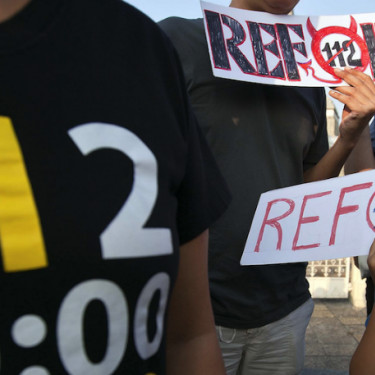Concern about mass lèse-majesté charges against journalists after king’s death

Reporters Without Borders (RSF) calls on Thailand’s junta, the National Council for Peace and Order (NCPO), not to restrict reporting and not to embark on a massive crackdown on all those, including journalists and Internet users, who comment on the King Bhumibol Adulyadej’s death, announced by today, and its consequences.
As national mourning is declared for Thailand’s 70 million inhabitants, RSF is concerned about possible reprisals against local and foreign reporters who, in the coming days and weeks, cover and comment on political events linked to the 88-year-old king’s death and the succession.
“We caution Prime Minister Prayut Chan-o-cha against using lèse-majesté charges to silence either journalists or members of the public, who are the ones most affected by the king’s death,” said Benjamin Ismaïl, the head of RSF’s Asia-Pacific desk.
“Even if Thailand now faces many political uncertainties, we think it is not only inevitable but also essential that the media and social networks discuss all political issues including the monarchy and the current political regime. Restricting the public debate would be contrary to the duty of the government and NCPO to serve the general interest.”
There is no shortage of taboos for the media in Thailand but lèse-majesté (criticizing the monarchy) is the biggest headache because the charge is widely used and it is punishable by three to 15 years in prison under article 112 of the penal code. Journalists even hesitate to cover lèse-majesté court cases or to do online searches for terms related to the subject.
Hundreds of people, including journalists, intellectuals, academics and politicians, have been arrested on lèse-majesté charges. As no more than an anonymous phone call suffices for the Department of Special Investigations to begin an investigation, strict self-censorship is the rule.
Three journalists are currently serving a prison sentence on a lèse-majesté charge. One is Somyot Prueksakasemsuk, the editor of the magazine Voice of Thaksin, who was sentenced to 11 years in prison for publishing two articles (not by him) in 2010 that were deemed to have defamed the king and the monarchy.
A military court sentenced Kathawuth Bunphithak, a citizen-journalist and online radio presenter to five years in prison on 18 November 2014 for hosting a web radio programme on political subjects that allegedly violated the lèse-majesté law. Six days later, Thai E-News website editor Somsak Pakdeedech was sentenced to four and a half years in prison for posting an article he did not write himself.
Ranked 136th out of 180 countries in RSF’s 2016 World Press Freedom Index, Thailand has seen drastic curbs placed on media freedom since the military staged a coup in May 2014.
RSF issued a report on the situation in Thailand in November 2015. Entitled “Media hounded by junta since 2014 coup,” it urges the Thai authorities to stop using draconian media legislation in order to gag critical and independent media, censor the Internet and spy on bloggers and anyone posting “critical” information on social networks.



